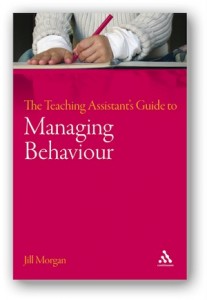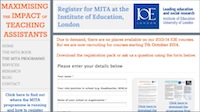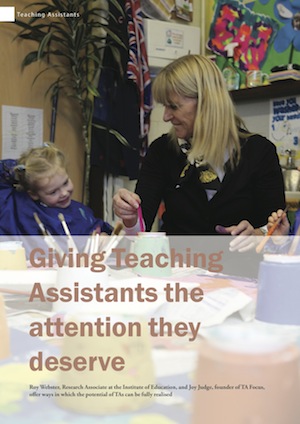Alex Cunningham, Labour MP for Stockton North, recently led a debate in Westminster Hall on the value of Teaching Assistants in schools.
The Value of Teaching Assistants by Alex Cunningham MP
 Ask any parent or teacher the value of education, and they will confirm without hesitation the importance of giving children the best start in life and opening the doors to opportunities that will allow, and indeed encourage, them to succeed.
Ask any parent or teacher the value of education, and they will confirm without hesitation the importance of giving children the best start in life and opening the doors to opportunities that will allow, and indeed encourage, them to succeed.
To realise this goal, we need not only to provide an education for our children, but to ensure that young people are taught well. And it is in facilitating this outcome that Teaching Assistants most clearly demonstrate their importance to our schooling system.
Rather than being the high-cost and low-return intervention many have derided them as being, Teaching Assistants add tremendous value to classrooms and hold a huge potential to improve and enrich educational outcomes.
And this is why the 2003 Workload Agreement in England and Wales – an effort of the last Labour government to recognise this potential and to raise standards in schools – significantly increased the number of Teaching Assistants, who now make up around 27.5% of the total school workforce in England, with more than 359,000 in classrooms across England alone.
The aim of the Agreement was simple: to allow teachers to actually teach by lessening pressures and reducing burdens elsewhere. Yet, despite the promise and potential Teaching Assistants provide, these valuable assets are undervalued and often underpaid, while their contributions go largely unrecognised.
While the need for great teachers at all levels is self-evident, a report from Reform in 2010 took this requirement further – and much too far, I would argue – by suggesting that Ministers “[r]emove the various Government interventions into the cost and size of the teaching workforce” to increase accountability to parents and strengthen management and performance.
A natural consequence, the report contended, would be “a fall in the number of teaching assistants, since the value of the rapid growth in their numbers is not supported by the research evidence”. But their conclusions were based on some very narrow and selective data negating them.
With primary schools spending £2.8 billion on Teaching Assistants and support staff in 2010/11, and secondary schools spending £1.6 billion during the same period, it is perhaps unsurprising that their role and worth have found their way into the public spotlight.
The Institute for Education’s Deployment and Impact of Support Staff project, for instance, suggested a negative relationship between the amount of Teaching Assistant support and academic progress in students, while Reform indicated that £1.7 billion could be saved each year through reducing costs associated with Teaching Assistants.
These questions, however, are very much the result of a Government whose focus is squarely aimed on resource allocation and productivity per pound spent rather than on the actual educational outcomes and opportunities that this spending yields. Or, to put it another way, an ideologically driven attentiveness to cost at the expense of value.
An example of the selective use of data is the Teaching and Learning Toolkit produced by a collaboration of the Education Endowment Foundation and the Sutton Trust. While it is true that the toolkit suggests that Teaching Assistants have a low impact for a high cost, it is important that the toolkit also specifies that this judgment is “based on limited evidence”. The implication, of course, being that the sentiment should not necessarily be taken at face value, or at least not without the addition of substantial caveats.
Indeed, the Education Endowment Foundation made it clear that such a simplistic reading of their evidence is decidedly unhelpful, with the toolkit also specifying that Teaching Assistants “can have a positive impact on academic achievement”. Unsurprisingly, this assessment was not given equal weighting by Reform in their report, which appears to have been aimed at generating scaremongering headlines rather than addressing the real issues affecting Teaching Assistants.
And the Government’s indifference to support staff has only added to the anxiety. While the last Labour government legislated for a School Support Staff Negotiating Body, this body was abolished within the first year of the Coalition as quangos were indiscriminately eliminated in a brutal cost-cutting drive.
Similarly, the Government has axed national funding for Higher Level Teaching Assistant training and has archived all the national Teaching Assistant and Higher Level Teaching Assistant training resources and guidance, with high-quality training for Teaching Assistants becoming just another victim of the Coalition Government’s austerity package.
Fortunately, with school leaders having responsibility for employing support staff rather than the Department for Education, more Teaching Assistants have been sought rather than less, despite the negative agenda of the Government. The 5.7% increase between 2011-12 reflects the 95% of school leaders who say that Teaching Assistants add real value in schools.
And in case there was any doubt, Ofsted, who routinely report on the positive impact of Teaching Assistants despite not having an official remit of inspection for support staff, have looked upon their role very favourably.
But with schools set to receive additional funding to better support disadvantaged students, it is high time that the Government clarified its strategy on Teaching Assistants – not only how they are to be funded, but also guidance on how they are to be trained and qualified to ensure that their contributions have the maximum impact on the education of those young people they help.
At the same time, school leaders also need to be clear about the role and purpose they see Teaching Assistants fulfilling in their schools, defining the contributions they will make to learning. And this means initiating specific opportunities for teachers to liaise with Teaching Assistants in advance of lessons, not only so they know what will be taught, but so that they are clear on what tasks will be undertaken and their specific responsibilities, as well as the expectations that the teacher has of pupils.
As with teachers, it is precisely this environment of openness and collaboration that we must foster if we are to raise standards and rival the best education systems in the world. And, again similar to teachers, one key measure in doing this is to promote continuous professional development that will ensure their knowledge and skills remain at the fore.
It is this level of training and development that will allow Teaching Assistants to properly deliver specific, high-quality teaching interventions that will be to the advantage of teachers and pupils alike, whether it be in the shape of specialist support for pupils with special needs, administrative support to teachers to ease the pressure, or targeted interventions in other areas of learning.
The latest research from the Education Endowment Foundation confirms that well-trained Teaching Assistants can make a real difference, demonstrating the significant positive effects they can have in literacy and numeracy “when they are deployed well”. And this is the crucial point – Teaching Assistants, when properly instructed and deployed, “can be effective at improving attainment”.
Properly utilised, Teaching Assistants are neither low-cost substitute teachers, nor high-cost babysitters. Rather, when deployed effectively, the reality is that they add significant value to our education system and improve the learning and support that our young people are able to access. It is only right that we recognise this.
 Jill Morgan’s The Teaching Assistant’s Guide to Managing Behaviour is a brilliant addition to the Teaching Assistants Series of books by Continuum (Bloomsbury) publishers.
Jill Morgan’s The Teaching Assistant’s Guide to Managing Behaviour is a brilliant addition to the Teaching Assistants Series of books by Continuum (Bloomsbury) publishers.
 Every year, SEN support staff and teachers are encouraged to apply for the National Scholarship Fund for any specialist training. Applicants have a small timeframe to apply, as the closing date is just four weeks away.
Every year, SEN support staff and teachers are encouraged to apply for the National Scholarship Fund for any specialist training. Applicants have a small timeframe to apply, as the closing date is just four weeks away.


